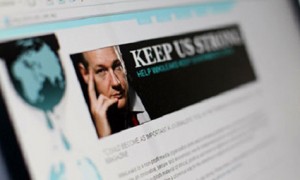 You know you’ve hit something deep when so many natural political enemies discharge the same denunciation at the same time. The WikiLeaks revelations hit a magma reservoir. The revelations have united the fury of the Obama administration with that of Congress, the Clintons with National Review, Diane Feinstein with Sarah Palin, Glenn Beck with Jon Stewart. But they all seemed to have missed the point.
You know you’ve hit something deep when so many natural political enemies discharge the same denunciation at the same time. The WikiLeaks revelations hit a magma reservoir. The revelations have united the fury of the Obama administration with that of Congress, the Clintons with National Review, Diane Feinstein with Sarah Palin, Glenn Beck with Jon Stewart. But they all seemed to have missed the point.
Liberal Senator Diane Feinstein described the leak of classified documents, as “a serious breach of national security and could be used to severely harm the United States and its worldwide interests.” On the other side of the political world, Sarah Palin echoed that outrage and wondered why the government wasn’t pursuing WikiLeaks founder, Julian Assange “with the same urgency we pursue al Qaeda and Taliban leaders.” The chair of the British intelligence and security commisson said “the information will severely damage operations against terrorism,” and Italian foreign minister, Franco Frattini, declared the revelations the “September 11th of world diplomacy.”
What common value has blended these normally disjointed voices so closely? It’s not visible on the surface. And the critics of WikiLeaks sometimes try to say different things. It’s certainly not the issue that many of the pundits think it is. For example, Jon Stewart’s Daily Show and Secretary of State Clinton have both minimized the leaks as revealing nothing interesting or unusual. Stewart mocked the revelations as “non-policy chitchat we already knew” and “less than a searing indictment.” He said WikiLeaks founder, Julian Assange, should “stop the drama.” But Stewart keeps devoting large segments of his show to discussing it.
Hilary Clinton joked about the leaks at first, and then declared, “This disclosure is not just an attack on America — it’s an attack on the international community.” Such leaks, she said, “tear at the fabric” of responsible government.
The initial attempt to dismiss the leaks as trivial completely misses the point. The point was not the actual content of the leaks, though some of the correspondence has revealed typical government lies. The point was not to deliver a second “Pentagon Papers”. The revelations could have indeed been mere chitchat about embassy menus and still accomplished the more devastating goals of Julian Assange.
Back in 2006, Assange explained his goals in terms of using leaks to reduce the power of the insider elite. Assange described any typical “collaborative secrecy, working to the detriment of the population, is enough to define their behavior as conspiratorial.” The secrecy of any government makes it a conspirator of sorts and Assange’s stated goal is to turn conspiracies against themselves, or to use biblical language, “a kingdom is divided against itself, that cannot stand.” (Mark 3:24).
Assange described the power of leaks in these terms: “a conspiracy is a type of cognitive device that acts on information acquired from its environment; distorting or restricting these inputs means acts based on them are likely to be misplaced. Programmers call this effect garbage in, garbage out.” With leaks of classified information, Assange says, the “interesting idea is to split the total conspiratorial power in half.” In other words, the goal of leaks is to “blind a conspiracy by distorting or restricting the information available to it.” If a government cannot communicate freely in secret, whatever the secret, then it loses power. If U.S. diplomacy suffers because other countries will not speak freely to it, then all of them will experience a diminishing of power. Assange adds, “A conspiracy sufficiently engaged in this manner is no longer able to comprehend its environment and plan robust action.”

WikiLeaks founder Julian Assange
This is exactly the fallout. As former Ambassador R. Nicholas Burns has stated, “I think the leaking of these cables has been a travesty. He has done great harm to our diplomacy, because it strikes at the heart of what diplomacy is: The building of trust between people and between governments. The leaks are going to make some people much more reluctant to discuss their affairs with American diplomats.”
Diminishing government power—that’s the effect of even the most trivial leaks, and that’s the point of WikiLeaks. The point isn’t the content of the cables, and it’s not even about the need for more openness. It’s not about putting any diplomat or government official in harm’s way or stopping some international crime. It’s about slowly putting sand in the gears of the most unbelievably powerful set of nations in world history.
Think about it. What is the purpose of secrecy anyway? It’s always about maintaining an upper hand, either to dominate someone else or to keep from being dominated. But does the United States really have any genuine or serious fear about being dominated by our allies who are mentioned in the cables? It looks like this kind of secrecy is about dominating other nations.
But Christians have to bristle at such naked claims of power, especially given Jesus’ cutting words about Roman Imperial power: “You know that the rulers of the Gentiles lord it over them, and those who are great exercise authority over them. Yet it shall not be so among you; but whoever desires to become great among you, let him be your servant. And whoever desires to be first among you, let him be your slave.” (Matthew 20:25) His challenge is deep and perhaps unfathomable to our narrow political imaginations. George Washington would concur, and perhaps a rereading of his Farewell Address is in order for our diplomats, with special attention to his warning about “the mischiefs of foreign intrigue.”
At the very least, we should rethink the secular groupthink condemnation of WikiLeaks.
Should we, in some way, be pleased with WikiLeak’s attempt to reduce government power? It depends. This question can’t be answered in a moral vacuum. Is WikiLeaks a Judas or a David-fighting-Goliath? Relativists and idolaters of raw power don’t have the tools to answer that question. It’s likely Assange himself doesn’t have the moral plumb line to answer it either. Judas sided with the power elite of the Temple authorities. However, when David used a small, simple weapon to hit a pretty big target, the enemy scattered. Totalitarian domination took a hit that day.
If you liked this article you may be interested in this product from our sponsor.

 Off The Grid News Better Ideas For Off The Grid Living
Off The Grid News Better Ideas For Off The Grid Living



